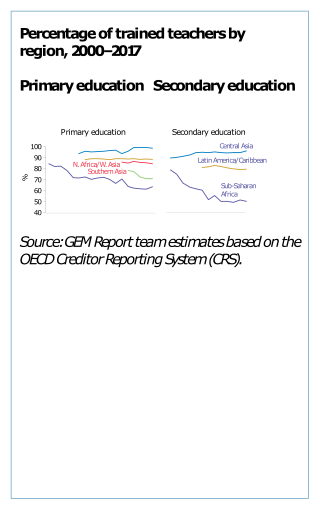
A teacher, also called a schoolteacher or formally an educator, is a person who helps students to acquire knowledge, competence, or virtue, via the practice of teaching.

The Qualifications and Curriculum Development Agency (QCDA), previously known as the Qualifications and Curriculum Authority (QCA), was a charity, and an executive non-departmental public body (NDPB) of the Department for Education. In England and Northern Ireland, the QCDA maintained and developed the National Curriculum and associated assessments, tests and examinations, advising the minister formerly known as the Secretary of State for Education on these matters.

Education in England is overseen by the Department for Education. Local government authorities are responsible for implementing policy for public education and state-funded schools at a local level. State-funded schools may be selective grammar schools or non-selective comprehensive schools. All state schools are subject to assessment and inspection by the government department Ofsted. England also has private schools and home education; legally, parents may choose to educate their children by any suitable means.

The National College for Teaching and Leadership (NCTL) was an executive agency of the British Department for Education from 2013 to 2018. It inherited the responsibilities of the National College for School Leadership (NCSL). The NCTL aimed to improve academic standards by ensuring a well-qualified teaching workforce and supporting schools.
Qualified teacher status (QTS) or Qualified Teacher Learning and Skills status (QTLS) is required in England and Wales to work as a teacher of children in state schools under local authority control, and in special education schools. QTS is not required at academies, free schools or independent schools. A similar status exists under a different name in Scotland and Northern Ireland.

Punjabi University is a collegiate state public university located in Patiala, Punjab, India. It was established on 30 April 1962 and is only the second university in the world to be named after a language, after Hebrew University of Israel. Originally it was conceived as a unitary multi-faculty teaching and research university, primarily meant for the development and enrichment of the Punjabi language and culture, but alive to the social and education requirements of the state.

Teacher education or teacher training refers to programs, policies, procedures, and provision designed to equip (prospective) teachers with the knowledge, attitudes, behaviors, approaches, methodologies and skills they require to perform their tasks effectively in the classroom, school, and wider community. The professionals who engage in training the prospective teachers are called teacher educators.

Open University is a public university in South Tangerang, Banten, Indonesia. The university employs a Open and Distance Learning (ODL) system to widen access to higher education to all Indonesian citizens, including those who live in remote islands throughout the country, and in various parts of the world. It has a total student body of 1,045,665. According to a distance education institution in the UK, which published "The Top Ten Mega Universities", UT-3 ranks closely with universities from China and Turkey.
The General Teaching Council for Scotland is a fee based registered charity and the world's first independent registration and regulation body for teaching. The current Chief Executive and Registrar is Pauline Stephen. The GTC Scotland maintains a register of qualified teachers and college lecturers; there were 80,695 teachers and college lecturers on the register on 31 March 2022.
The Graduate Teacher Programme (GTP) was a programme in England and Wales for graduates who want to gain Qualified Teacher Status while working. A person must work in a school as an unqualified teacher in order to participate in the programme, which can last from three months to a year. The Department for Education announced in mid-2012 that The Graduate Teacher Programme will no longer exist, and has now been replaced with a new scheme called School Direct. The last academic year the programme ran was 2012/2013.
Sir Brian Keith Follett is a British biologist, academic administrator, and policy maker. His research focused upon how the environment, particularly the annual change in day-length (photoperiod), controls breeding in birds and mammals. Knighted in 1992, he won the Frink Medal (1993) and has been a Fellow of the Royal Society since 1984, and served as the chair of the UK government's teacher training agency and Arts and Humanities Research Council, and was Vice-Chancellor of University of Warwick.

The General Teaching Council for England (GTCE) was the professional body for teaching in England between 2000 and 2012. The GTC was established by the Teaching and Higher Education Act 1998 which set two aims: "to contribute to improving standards of teaching and the quality of learning, and to maintain and improve standards of professional conduct among teachers, in the interests of the public". The GTC was abolished in 2012 with some of its functions being assumed by the Teaching Agency, an executive agency of the Department for Education, which in 2013 became the National College for Teaching and Leadership.

The Education Act 2005 is an act of the Parliament of the United Kingdom. Introduced under the second Tony Blair government, it was enacted in order to simplify the process of school improvement, strengthening the accountability framework for schools, in particular by amending the approach used by Ofsted when inspecting schools in England. This Act repealed the provisions of the School Inspections Act 1996.

A certified teacher is an educator who has earned credentials from an authoritative source, such as a government's regulatory authority, an education department/ministry, a higher education institution, or a private body. This teacher qualification gives a teacher authorization to teach and grade in pre-schools, primary or secondary education in countries, schools, content areas or curricula where authorization is required. While many authorizing entities require student teaching experience before earning teacher certification, routes vary from country to country.
The Institute for Learning (IfL) was a voluntary membership, UK professional body. It ceased operating on 31 October 2014. Although precise membership figures and statistical details had been removed from IfL's webpage prior to its closure, at the end of financial year 2013-2014 IfL were reported as having only 33,500 of their 200,000 members remaining.

The Department for Education (DfE) is a ministerial department of the Government of the United Kingdom. It is responsible for child protection, child services, education, apprenticeships, and wider skills in England.
Higher education accreditation is a type of quality assurance and educational accreditation process under which services and operations of tertiary educational institutions or programs are evaluated to determine if applicable standards are met. If standards are met, accredited status is granted by the agency.

The Education Act 2011 is an Act of the Parliament of the United Kingdom. It was the first major piece of education legislation to be introduced by the coalition government, and makes changes to many areas of educational policy, including the power of school staff to discipline students, the manner in which newly trained teachers are supervised, the regulation of qualifications, the administration of local authority maintained schools, academies, the provision of post-16 education, including vocational apprenticeships, and student finance for higher education.
The Teacher Development Trust is a UK charity which works to raise awareness of the importance of professional development for teachers and other education professionals.











